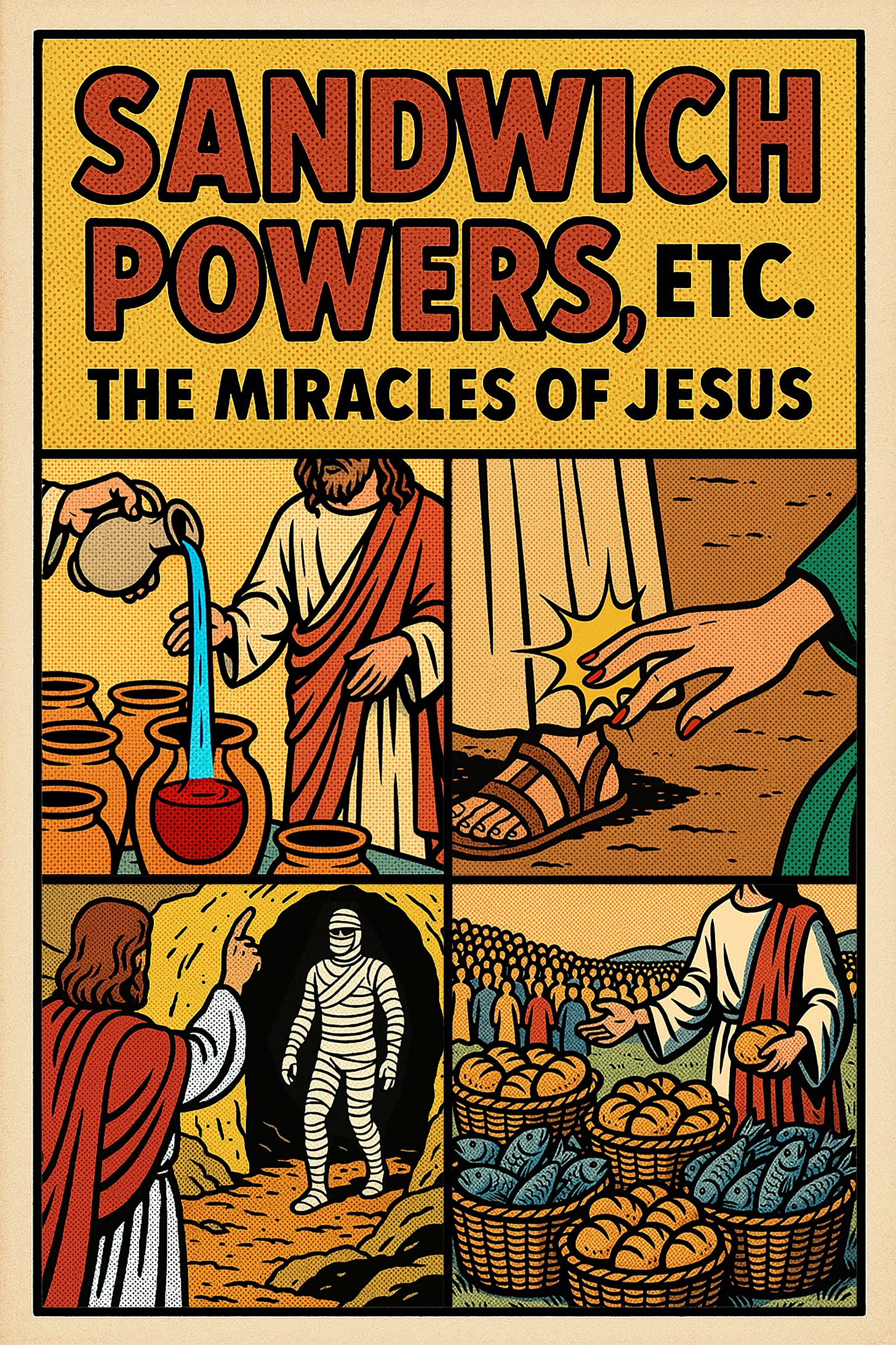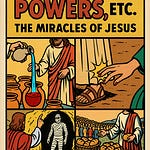John 2.1-11
I’m heading back from the Iowa Preachers Project and not on tap this Sunday, but here is a sermon from the vault that fits into our current lectio continua series through the Miracles of Jesus.
Now standing there were six stone water jars for the Jewish rites of purification, each holding 20 or 30 gallons. Six stone jars. Let's round to the middle, say 25 gallons. Unlike my boy's homework, this is the sort of math I know how to do.
If or when the implodes, I could get a gig in a restaurant kitchen. Back in middle school, I was the doogie-houser of home economics. My Italian grandma was a chef. I've got knife skills. I've got all the mother sauces memorized. I'm a pretty good cook. So that's four quarts to a gallon. One quart equals roughly six glasses— cabernet glasses— and that gives you a minimum grand total of 2,160 glasses of wine that had been water.
That's a lot of wine.
Even if I’m coming to your party, that's a lot of wine.
And Jesus makes not three buck chuck. Jesus transforms water into top shelf pinot. Pretty impressive party trick, Jesus. But not to be outdone. Not to be outdone, Jesus' friends, you and I, the church, we've somehow managed to pull off the even more difficult feat of transforming gold-metal wine of grace into the tasteless, odorless, joyless, everyday water of the law.
We've turned the gospel into Iocane powder.
Jesus kicks off the salvation of the world by turning water into wine, but we've pulled off the even more impossible trick of turning his wine back into water. Jesus can turn water into wine, sure, but look at us. We're like David Copperfield walking through the Great Wall of China. We are able to turn Christ's wine back into water.
And Jesus just did that at Cana that one time. That's it. We turn his wine into water again and again and again and again.
I'm sorry. I apologize. I realize this is like a rookie preacher's mistake, beginner stuff. I know it's a bad rhetorical strategy to give away my main point right at the get-go, wine into water. What the heck was I thinking? Forget all about that phrase, wine into water. Think about anything other than “wine into water.” Pretend I never said anything at all about how we turn wine back into water. Whatever you do, do not think at all about how we revert his wine into water.
150 gallons, 150 gallons for drunk people to drink.
That's a pretty impressive sleight of hand. Still though, it's a queer way for Jesus to begin his redemptive work. In John's gospel, Jesus begins his ministry not by preaching or teaching, not by casting out demons or curing disease like in Mark's gospel.
Here in John, Jesus doesn't lift up a single lowly poor person or speak one syllable of truth to power. Instead, in John's gospel, Jesus kicks off his redemptive work by being Mary's plus one at a wedding party. A celebration where Jesus, in a pinch, proves he's an even better bartender than Tom Cruise in the 1988 film Cocktail. It seems like a strange way for John to begin the story of our salvation. And then John interrupts the party play-by-play to report to you that Jesus did this, the first of his signs, in Cana of Galilee and revealed his glory. And notice, John doesn't call the wine that had been water a miracle. John calls the wine that had been water a sign. Miracles are momentary intrusions by God into the natural order. Miracles are ends in themselves, but signs point beyond themselves. In Matthew, Mark, and Luke, Jesus performs miracles, but in John's gospel, Jesus does signs.
Seven signs.
Signs signify.
We're meant to see here more than a miracle. We're meant to see here more than an ordinary marriage supper. And there's so much here to see. You take the six stone jars, they're a sign. This wedding at Cana, it isn't the sort of wedding where your Aunt Becky buys credentials online for $69.99 in order to be able to officiate the I-do's. This wedding at Cana is a worship service. It's a worship service. Therefore, you can't just show up with your invite, black tie, and gift from William Sonoma. To come to this wedding is to come before God. And according to the Bible, God is not like Mr. Rogers. You're not acceptable before God just the way you are. You have to be made acceptable. You have to be purified. You have to be justified. And so as the guests would arrive for the nuptials, before they'd get handed their program, they would dip their hands into the stone jars to wash away their sin and render themselves ritually clean.
The jars were made of stone, not clay, because clay is porous and the water would get dirty in clay jars. And the whole purpose of these jars is to remove impurity. The water in the stone jars was to justify you, to make you blameless before a holy God. But it didn't work. And not only are those stone jars standing there empty and idle, abandoned,
John tells you there were six stone jars and six, being one less than seven, is the Jewish number for incompleteness and imperfection. It's a sign. And with this sign, John's showing you that this whole system of making ourselves acceptable to God by dint of our own good deeds and religious doings, it didn't work. There's so much here to see.
Giving in to his mother's grumblings, Jesus tells the caterers at Cana, fill the sown jars with water. Do you see? Do you see? Jesus is taking this system of making ourselves blameless and acceptable before God, and he's transferring it to himself. Jesus is taking these means by which we are able to meet God, and he's making himself in charge of it.
It's a sign. John wants you to see here at the get-go of his gospel what you'll hear later in his gospel, that the only way you can meet God is by the gracious doing of Jesus Christ for you. He is the way, the truth, and the life. He is your justification, and your justification, it's on the house, by his grace.
And for those of us who are not perfect and without blemish, that's good news. There's so much good stuff to see here. Notice the amount of water, 150 gallons. It's a sign.
The Jewish Talmud specifies how much water is necessary for the ritual of purification, and according to the Talmud, one cup of water, that's eight fluid ounces, one cup of water is enough water to purify and justify 100 men. This is
19,200 ounces of water. My boys are better at that sort of math than me, but that's enough water to justify almost two million people. Which is more people than a first century Jew like John could imagine. You all have ears enough to see here, don't you? This is John showing you that Jesus Christ is able.
Able by dint, not of your own doing, but by nothing but his own merit. He is able to bring the whole world to his father. It's a sign. And John wants you to see what you'll hear Jesus say to the woman at the well, I am living water.
Everyone who drinks of me will never be thirsty again, for the water I give will become in them a spring of water gushing up to eternal life." There's so much good stuff to see here with the wine! Jesus takes the water that was necessary because of sin and he transforms it into 2,000 glasses of the finest vintage vino. It's a sign!
According to the prophets Amos and Hosea and Jeremiah and Isaiah, the arrival of God's cosmic work of salvation will be occasioned by an abundance of the very best wine. John wants you to see that in the incarnation of Jesus Christ into our world, God is making good on God's promise to the prophet Isaiah today. When Isaiah
When Israel languished in exile, convicted of their sin, and convinced that God had abandoned them for breaking their vow to him, God chooses a marriage supper. God chooses a wedding party as the image for how God would redeem his sinful people and reconcile all of creation.
And John wants you to see that with the arrival of God in the flesh into our world, the not yet of God's redemptive work in the Old Testament is here and now. It's a sign. With all these glasses of wine, John wants you to see that the future promised to Isaiah is present tense in Jesus Christ. Therefore, water is only the beginning of what he's about to transform.
Do you see?
Do you see?
It's a sign of what he promises later in the gospel. I have come so that you may have life, have life abundantly. There's so much good stuff to see here. Take the timing.
John tells you that Jesus and the disciples arrived to this wedding party at Cana on the third day. The third day since when exactly? It's an unhelpful, extraneous detail unless what John wants you to see is a hint of when Mary Magdalene will arrive at the empty tomb on the third day, the first morning of the new creation.
Speaking of new creation, this third day in Cana is actually the seventh day thus far in John's gospel. John, who begins his gospel with a deliberate echo of the Genesis creation story, John numbers the days in his gospel just like Genesis 2. And so if you turn to John chapter 1 verse 19, you'll see that's the first day. And then in verse 29, John tells you “on the next day.” And then in verse 35 John says, on the next day. So that's three days. And then in chapter 1 verse 43 John again says, on the next day. That's four days. And when you turn to chapter 2 at the wedding at Cana, John tells you three days later, on the seventh day. This marriage supper at Cana where Jesus arrives as a guest but ends up acting as the host.
“Do whatever he says,” Mary orders the caterers.
This wedding party where Jesus arrives as a guest but ends up acting as the host, it happens on the seventh day.
Translation?
This is no ordinary wedding party at all.
It's a sign.
It points beyond itself.
You're supposed to see here that at the beginning of Christ's work, you're supposed to see a glimpse of the end of Christ's work, the consummation of all things, this marriage supper where Jesus ends up acting as a host.
It's a sign of salvation.
Because at the very end of the Bible, in the book of Revelation, the occasion for John to announce the arrival of a new heaven and a new earth, the occasion for John to announce that death will be no more, mourning and crying and pain will be no more, the occasion for John to announce that good news is a wedding party. John calls the end of all things salvation and new creation. He calls it the marriage supper of the Lamb.
The date of the wedding matters because it's a sign.
John wants you to see a glimpse of your destiny.
And when you realize this wedding party at Cana is meant to point to the marriage supper of the lamb, new creation, heaven, eternal life, the whole kit and caboodle of everything God ever spoke into existence, when you see it's supposed to point to that, then you can begin to laugh at the outrageousness of God's indiscriminating grace. Because here at Cana, Jesus makes the best wine for drunk people to drink. Jesus pours bottomless glasses of top-shelf wine for people too drunk to appreciate drinking it. He takes the water from the stone jars and he transforms it into gold-metal wine for people too drunk to appreciate it. As the master of the feast says to the groom, everyone brings out the best wine first and then the cheap wine last after everyone's gotten drunk, but you save the best wine for now when they're drunk and won't even notice.
Even more crazy?
Even more crazy, the bridegroom and his family, who apparently failed to purchase enough wine for the celebration, they end up getting the credit for what Christ has done. The party planner tastes the wine that had been watered, John says, and he chalks it up to the bridegroom's extravagance. They get the credit that Christ alone merits, as though they'd done it themselves. It's a sign. Surely.
Surely you can see, right?
Earlier this week, one of you emailed me an article you found online. I clicked the link and I quickly praised God it had nothing to do with the LGBTQ issue in the UMC. At least, not obviously so. In fact, it was an ordinary obituary in the Des Moines Register.
Now I realize it might sound odd to mention death in the context of a wedding story, except A) every married couple will appreciate the irony and B) even Jesus here at this wedding talks of crucifixion.
“Woman, what concern is that to me?” Jesus says, “my hour has not yet come.”
The obituary was for a Nebraskan named Ken Fusen. It's one of those obituaries that's more than just an obituary.
It's a sign.
Ken Fusen's sons wrote:
“Ken Fusen was born June 23, 1956, and died on January 3, 2020, in a Nebraska medical center in Omaha of liver cirrhosis. And Ken is stunned to learn that the world is somehow able to go on without him. Ken attended the University of Missouri Columbia's famous School of Journalism, which is a clever way of saying, almost graduated, but didn't.
Facing a choice between covering a story for the Columbia Daily Tribune or taking his final exams, Ken went for the story. He never claimed to be smart, just committed. In 1996, Ken took the principled stand of leaving the Des Moines Register because the Sun in Baltimore offered him more money. Three years later, having blown most of that money at Pimlico Racetrack, he returned to the register, where he remained until 2008.
In his newspaper work, Ken never won a Pulitzer Prize, but he's dead now, so get off his back. There are those who would suggest that becoming a freelance writer in the midst of the worst recession since the Great Depression was not a wise choice, but Ken was never one to be guided by wisdom. He wrote the book, Heading for Home, with Kent Stock, about the 1991 Norway baseball team that won the state championship in its final season. Many good copies are still available.
Ken was diagnosed with liver disease at the beginning of 2019, which is pretty ironic given how he never drank, never a drop of beer, whiskey, or wine. So eat your fruits and vegetables, kids. Ken had many character flaws. If he still owes you money, he's sorry, sincerely. But he liked to think that he had a good sense of humor and deep compassion for others. He prided himself on letting other drivers cut in line.
He would give you the shirt off his back, even with the ever-present food stain. Thank goodness nobody ever asked. It wouldn't have been pretty. Ken was also a master jumbles solver. For most of his life, Ken suffered from a compulsive gambling addiction that nearly destroyed him and his family. But his church friends and the loving people at Gamblers Anonymous never gave up on him. Ken last placed a bet on September 5th, 2009.
He died clean. He hopes that anyone who needs help will seek it, which is hard, and accept it, which is even harder. Miracles abound. Ken's pastor says God can work miracles for you and through you. Skepticism may be cool, and for too many years Ken embraced it, but Jesus Christ transformed his life. Faith was the one thing he never regretted.
Jesus Christ transformed everything for him. For many years, Ken was a member of the First United Methodist Church in Indianola and sang in the choir, which was a neat trick considering he couldn't read a note of music. The choir members will never know how much they helped Ken. Ken then joined the Lutheran Church of Hope. If you want to know what God's transformative love feels like, just walk in those doors. Seriously. Go right now! We'll wait! Ken's not going anywhere. Yes, this obituary is probably too long. Ken always wrote too long. So we'll close by saying what he would say. God is good. See you in heaven. Ken promises to let you cut in line.
“Jesus did this, the first of his signs in Cana of Galilee, and revealed his glory.”
There's so much top shelf vintage stuff at this marriage supper in Cana for you and I to serve.
How about:
You are justified not by anything you do, but by the gracious doing of Jesus Christ for you. That's here at this marriage supper. So is not only are you blameless before God and acceptable to God, no matter what you've done or left undone, by grace, through faith, you are credited with what Jesus Christ has done. As though his singular faithfulness is your very own doing.
That's in here too at this marriage supper for you to see and for us to serve.
Ditto:
Christ's promise to give you life, abundant life, because water is the least of what Jesus Christ can transform and is transforming and will transform at the marriage supper of the Lamb.
That's here at this marriage supper too, for us to serve the guests of the bridegroom.
And that bridegroom:
That bridegroom, not only is he happy to lavish high dollar wine on people too drunk to appreciate it, in the crazy good fun of his grace, this bridegroom is happy to let all of us cut in line at Heaven's Gate. Miracles abound. God is good and Jesus Christ who is not dead can transform anything.
And it's all available to anyone at the rock bottom price of absolutely free. Our shelves are stocked. We've got so much good vintage five star stuff to serve the Bridegroom's guests, glass after glass after glass after glass.
And yet, these days, we're more interested in talking politics in the pews.













